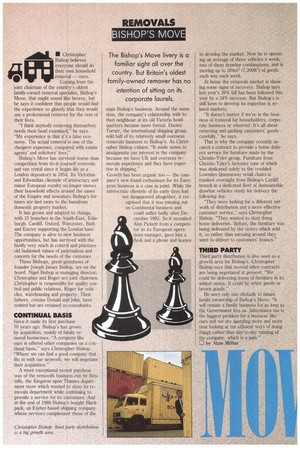REMOVALS BISHOP'S MOVE
Page 36

If you've noticed an error in this article please click here to report it so we can fix it.
The Bishop's Move livery is a familiar sight all over the country. But Britain's oldest family-owned remover has no intention of sitting on its corporate laurels.
• Christopher Bishop believes everyone should do their own household removal — once.
Coming from the joint chairman of the country's oldest family-owned removal specialist, Bishop's Move, that might sound like heresy, but he says it confident that people would find the experience so ghastly that they would use a professional remover for the rest of their lives.
"I think anybody removing themselves needs their head examined," he says. "My experience is that it's a false economy. The actual removal is one of the cheapest expenses, compared with estate agents' and solicitors' fees."
Bishop's Move has survived worse than competition from do-it-yourself removals and van rental since it began life as a London depository in 1854. Its Victorian and Edwardian clientele of aristocracy and minor European royalty no longer moves their household effects around the oases of the Empire and nowadays Bishop's fortunes are tied more to the humdrum domestic property market.
It has grown and adapted to change, with 15 branches in the South-East, Edinburgh, Cardiff, Oxford, Worcester, Bath and Exeter supporting the London base. The company is alive to new business opportunities, but has survived with the family very much in control and practises old fashioned values of paternalism and concern for the needs of the customer.
Three Bishops, great-grandsons of founder Joseph James Bishop, are on the board. Nigel Bishop is managing director; Christopher and Roger are joint chairmen. Christopher is responsible for quality control and public relations, Roger for vehicles, warehousing and property. Their fathers, cousins Donald and John, have retired but are retained as consultants.
CONTINUAL BASIS
Since it made its first purchase 70 years ago, Bishop's has grown by 'acquisition, mainly of family removal businesses. "A company like ours is offered other companies on a continual basis," says Christopher Bishop. "Where we can find a good company that fits in with our network, we will negotiate their acquisition."
A more exceptional recent purchase was of the removal's business run by Bentags, the Kingston upon Thames department store which wanted to close its removals department while continuing to provide a service for its customers. And . at the end of 1988 Bishop's bought Blackpack, an Exeter-based shipping company Whose services complement those of the main Bishop's business. Around the same time, the company's relationship with its then neighbour at its old Victoria headquarters became more formal. Davies Turner, the international shipping group, sold half of its relatively small overseas removals business to Bishop's. As Christopher Bishop eidains: "It made sense to amalgamate our interest in the company because we have UK and overseas removals experience and they have expertise in shipping."
Growth has been organic too — the company's new-found enthusiasm for its European business is a case in point. While the aristocratic clientele of its early days had not disappeared altogether, it rec ognised that it was missing out on Continental business and could suffer badly after December 1992. So it recruited Alan Pickett from a competitor as its European operations manager, gave him a desk and a phone and licence
to develop the market. Now he is operating an average of three vehicles a week, two of them drawbar combinations, and is moving up to 204m3 (7,2000) of goods each way each week.
At home the removals market is showing some signs of recovery. Bishop says last year's 26% fall has been followed this year by a 34% increase. But Bishop's is still keen to develop its expertise in related markets.
"It doesn't matter if we're in the business of removal for householders, corporate business or whoever. It's all about removing and packing customers' goods carefully," he says.
That is why the company recently secured a contract to provide a home delivery service for furniture made by the Christie-Tyler group. Furniture from Christie-Tyler's factories (one of which was dedicated solely to the troubled Lowndes Queensway retail chain) is trunked overnight from Bishop's Cardiff branch in a dedicated fleet of demountable drawbar vehicles ready for delivery the following day.
"They were looking for a different network of distribution and a more effective customer service," says Christopher Bishop. "They wanted to start doing home deliveries. Before, the furniture was being delivered by the stores which sold it, so rather than messing around they want to deliver to customers' houses."
THIRD PARTY
Third party distribution is also seen as a' growth area for Bishop's. Christopher Bishop says that several other contracts are being negotiated at present: "We could be delivering items of furniture in its widest sense.•It could be white goods or brown goods."
He sees only one obstacle to future family ownership of Bishop's Move: "It will remain a family business for"as long as the Government lets us. Inheritance tax is the biggest problem for a business like ours and we are spending more and more time looking at tax efficient ways of doing things rather than daY-to-day running Of the company, which is a pain." D by Alan Millar




























































































































